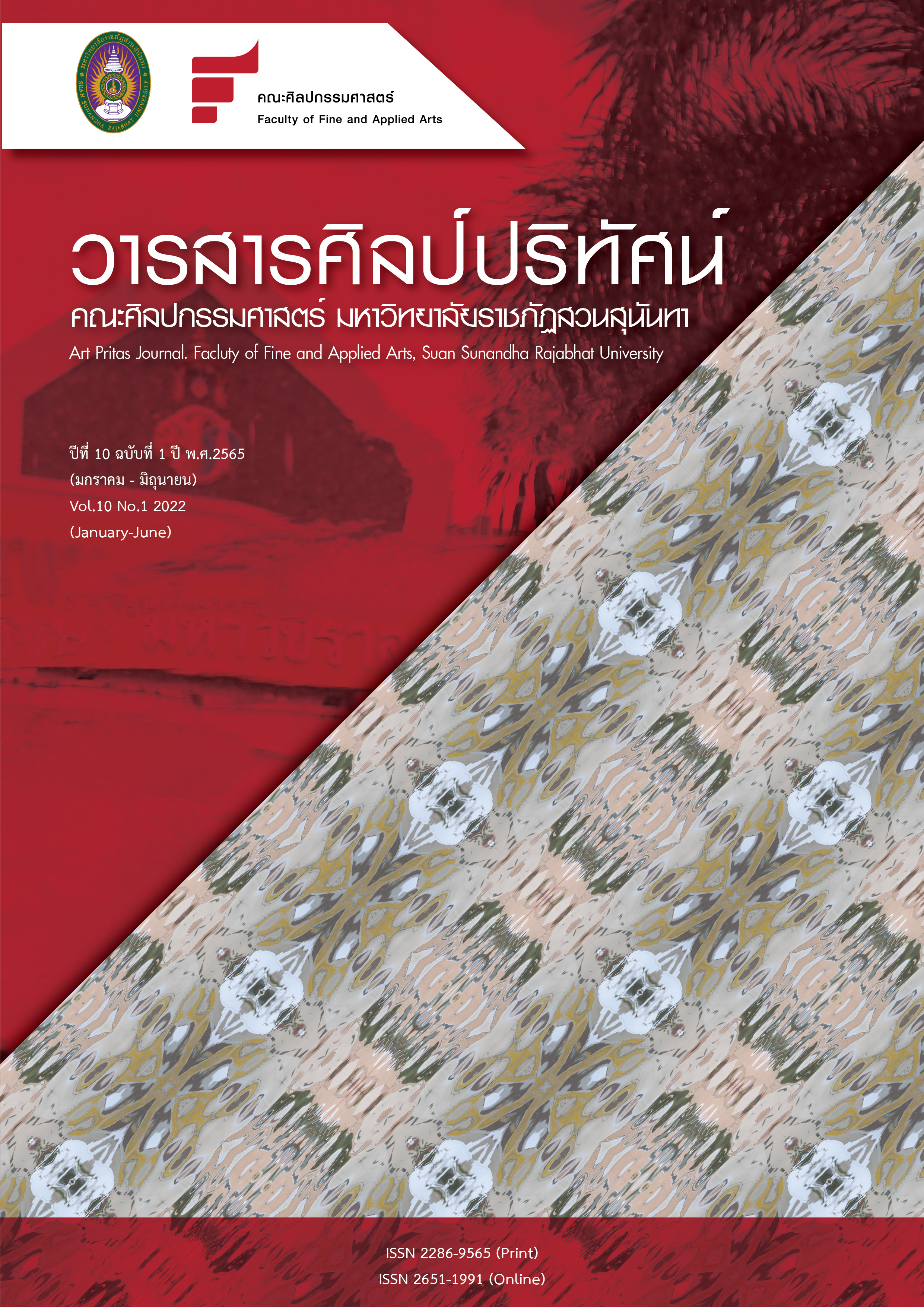การออกแบบกิจกรรมการเรียนรู้เพื่อพัฒนาทักษะการแสดงด้วยกระบวนการจิตตปัญญาศึกษา และทฤษฎีผู้นำ 4 ทิศ
Main Article Content
บทคัดย่อ
งานวิจัยนี้เป็นการวิจัยแบบผสานวิธี โดยมีวัตถุประสงค์เพื่อ 1. เพื่อศึกษากระบวนการจิตตปัญญาศึกษาให้ประยุกต์ใช้เป็นเครื่องมือพัฒนาทักษะการแสดง และ 2. เพื่อออกแบบกิจกรรมการเรียนรู้ด้วยกระบวนการจิตตปัญญาศึกษาและทฤษฎีผู้นำ 4 ทิศให้ส่งเสริมการเข้าถึงบทบาทการแสดง งานวิจัยนี้ใช้รูปแบบการวิจัยประเภทกึ่งทดลองที่ดำเนินการแบบกลุ่มเดียว และมีการทดสอบก่อนและหลังการทดลอง ให้กับนักเรียนการแสดงจำนวน 15 คน เครื่องมือวิจัยประกอบด้วย การสังเกตอย่างมีส่วนร่วม การสัมภาษณ์ และการสนทนากลุ่ม ผลการศึกษาพบว่า ผู้เข้าอบรมได้รับการเรียนรู้อย่างมีประสิทธิภาพจากการใช้กิจกรรมผ่านประสบการณ์ตรงที่ผ่านการออกแบบกิจกรรมตามแนวทางจิตตปัญญาศึกษา 3 ประการได้แก่ 1.) การฟังอย่างลึกซึ้ง 2.) การน้อมใจพิจารณาอย่างใคร่ครวญ 3.) การตระหนักรู้เห็นสรรพสิ่งตามที่เป็นจริง ผลการอบรมพบว่าผู้เข้าร่วมอบรม เกิดการเรียนรู้ใน 5 องค์ประกอบ ได้แก่ 1. การเข้าใจความคิดของตนเองและผู้อื่น 2. การเข้าใจอารมณ์และพฤติกรรมที่แสดงออกของตนเองและผู้อื่น 3. การเข้าใจแรงจูงใจของตนเองและผู้อื่น 4.การฝึกจัดการกับการแก้ปัญหาเฉพาะหน้า และ 5. การฝึกการแสดงออกและการสื่อสาร โดยทั้งหมดนี้ก่อให้เกิดกระบวนการเรียนรู้ 3 ขั้นตอน คือ 1. การเรียนรู้มิติภายในตัวเอง 2. การเข้าใจผู้อื่น และ 3. การสามารถถ่ายทอดความเป็นตัวละครได้ นอกจากนี้ กลุ่มผู้เข้าอบรมทั้ง 15 คน ยังสะท้อนว่า นอกเหนือจากการได้พัฒนาทักษะด้านการแสดงแล้ว การเรียนรู้จากกิจกรรมที่จัดขึ้นสามารถปรับใช้ได้จริงในชีวิตประจำวันอีกด้วย
Article Details

อนุญาตภายใต้เงื่อนไข Creative Commons Attribution-NonCommercial-NoDerivatives 4.0 International License.
เนื้อหาและข้อมูลในบทความที่ลงตีพิมพ์ในวารสารศิลป์ปริทัศน์ ถือเป็นข้อคิดเห็นและความรับผิดชอบของผู้เขียนบทความโดยตรง ซึ่งกองบรรณาธิการวารสารไม่จำเป็นต้องเห็นด้วย หรือร่วมรับผิดชอบใดๆ
บทความ ข้อมูล เนื้อหา รูปภาพ ฯลฯ ที่ได้รับการตีพิมพ์ในวารสารศิลป์ปริทัศน์ถือเป็นลิขสิทธิ์ของวารสารศิลป์ปริทัศน์
เอกสารอ้างอิง
DISC Model. (2560). สืบค้น 8 มีนาคม 2563, จาก https://www.mycareer-th.com/res_disc_model.php
คริสตอฟเฟอร์ สเวนซัน. (2018). The Standard. Retrieved 1 March 2018, from https://thestandard.co/meryl-streep/
เกรียงไกร ฟูเกษม. (2556). กระบวนการสร้างสรรค์ละครเวทีเพื่อการเรียนรู้เพื่อการเปลี่ยนแปลงมโนทัศน์ของนักแสดง. (ปริญญานิพนธ์มหาบัณฑิต). จุฬาลงกรณ์มหาวิทยาลัย.
โครงการผู้นำแห่งอนาคต. (2561). Fried-egg Theory. สืบค้น 20 มิถุนายน 2564, จาก https://www.leadershipforfuture.com /%E0%B8%81%E0%B9%89%E0%B8%B2%E0%B8%A7%E0%B8%82%E0%B9%89%E0%B8%B2%E0%B8%A1%E0%B8%AA%E0%B8%B9%E0%B9%88%E0%B8%81%E0%B8%B2%E0%B8%A3%E0%B9%80%E0%B8%A3%E0%B8%B5%E0%B8%A2%E0%B8%99%E0%B8%A3%E0%B8%B9%E0%B9%89/
ชุติมา มณีวัฒนา. (2558). สื่อการสอน รายวิชา PER2111 การแสดง 2. สืบค้น 1 มีนาคม 2563, จาก elfar.ssru.ac.th /chutima_ma/pluginfile.php/43/block_html/content/หลักการแสดง-ยาว.pdf.
ชุติมา มณีวัฒนา. (2558). หลักการแสดงและการพัฒนาบทบาทนักแสดง. สืบค้น 1 มีนาคม 2563, จาก elfar.ssru.ac.th/chutima_ma
/pluginfile.php/35/block_html/content/6.%20บทที่%201%20ความรู้เบื้องต้นเกี่ยวกับการแสดง_3-34_.pdf.
ชุติมา มณีวัฒนา. (2558). หลักการแสดงและการพัฒนาบทบาทนักแสดง. สืบค้น 1 มีนาคม 2563, จาก www.elfar.ssru.ac.th /chutima_ma/
ตรีดาว อภัยวงศ์. (2558). ปริทัศน์ศิลปการละคร ภาควิชาศิลปการละคร คณะอักษรศาสตร์ จุฬาลงกรณ์มหาวิทยาลัย. กรุงเทพมหานคร: โครงการเผยแพร่ผลงานวิชาการ คณะอักษรศาสตร์ จุฬาลงกรณ์มหาวิทยาลัย.
ธนา นิลชัยโกวิทย์ และอดิศร จันทรสุข. (2559). ศิลปะการจัดกระบวนการเรียนรู้เพื่อการเปลี่ยนแปลง คู่มือกระบวนกรจิตตปัญญาศึกษา. นครปฐม: วี. พริ้นท์ (1991).
นเรศ เสวิกา. (2562). การพัฒนากระบวนการเรียนรู้ธรรมะผ่านกระบวนการจิตตปัญญาศึกษา. (ปริญญานิพนธ์มหาบัณฑิต). นครปฐม, ไทย.
นพมาส ศิริกายะ. (2528). การวิเคราะห์บทละคร ศ033. กรุงเทพฯ: ศูนย์สารนิเทศมนุษยศาสตร์ คณะอักษรศาสตร์ จุฬาลงกรณ์มหาวิทยาลัย.
ประเวศ วะสี. (2553). ระบบการศึกษาที่แก้ความทุกข์ยากของคนทั้งแผ่นดิน (พิมพ์ครั้งที่ 2). นครปฐม: ศูนย์จิตตปัญญาศึกษา มหาวิทยาลัยมหิดล.
พีรเทพ รุ่งคุณากร. (2559). จิตตปัญญาศึกษา : หนทางเล่าเรียนเก่าแก่ในโลกใหม่. วารสารศึกษาศาสตร์ มหาวิทยาลัยศิลปากร. 14(2), 29-39.
มัทนี รัตนิน. (2546). ความรู้เบื้องต้นเกี่ยวกับศิลปะการกำกับการแสดงละคอนเวที. กรุงเทพฯ: สำนักพิมพ์มหาวิทยาลัยธรรมศาสตร์.
ร่มฉัตร ธนาลาภพิพัฒน์. (2562). 101 Acting Notes from the set เคล็ดลับจากสมุดโน้ตในกองถ่าย. กรุงเทพมหานคร: บริษัท เนวิเกเตอร์ โลจิสติกส์ แอนด์ ทรานสปอร์ต จำกัด.
วรภัทร ภู่เจริญ. (2556). ศิษย์สี่ทัศน์ (พิมพ์ครั้งที่ 1). กรุงเทพฯ: สำนักพิมพ์อริยชน.
วรรณี งามขจรกุลกิจ. การเข้าใจ เข้าถึงผู้เรียนยุคดิจิทัลด้วย DISC Model. EXHIBITION IN TEACHING & LEARNING 2019, 157-173
วราภรณ์ พวงไทย. (2556). ‘แอคติ้ง โค้ช’ อับดับต้นๆ ของเมืองไทย รสสุคนธ์ กองเกตุ. สืบค้น 2 มิถุนายน 2563, จาก https://www.posttoday.com/life/healthy/231271
ศิริพงษ์ เพียศิริ. (2560). กระบวนการจิตตปัญญาศึกษาในชั้นเรียนศิลปะ. วารสารศึกษาศาสตร์ มหาวิทยาลัยขอนแก่น, 47-57.
สดใส พันธุมโกมล. (2538). ศิลปะของการแสดง (ละครสมัยใหม่) (พิมพ์ครั้งที่ 1). กรุงเทพฯ: สำนักพิมพ์จุฬาลงกรณ์มหาวิทยาลัย.
อรุณฉัตร คุรุวาณิชย์ และชนันญา น้อยสันเทียะ. (2564). ทฤษฎีการเรียนรู้ผ่านประสบการณ์ตรง. สืบค้น 21 พฤษภาคม 2564, จาก https://www.lifeeducation.in.th/ทฤษฎีการเรียนรู้จากประ/


